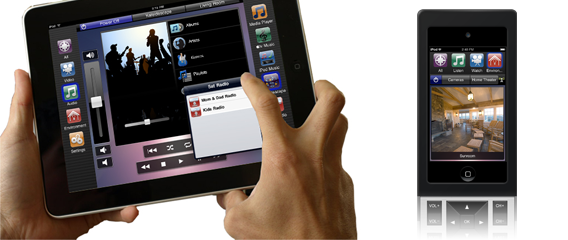Home control systems have been on the market for decades, but thanks to the growing sophistication of both the technology and consumers themselves, the idea is finally gaining critical mass. The convenience of automated and/or remote control of your home’s electronic devices and systems — entertainment, climate, security, lighting — is now accessible for any household. But what’s the best way to get started?
Here are 9 questions worth asking as you explore the possibility of a home control system for your own house:
1. What are you looking to accomplish?
Home control can be as elementary as being able to shut off a downstairs light from upstairs, but it can also be a sophisticated command center for virtually anything that runs on electricity in your house. Tasks like multi-room audio and basic lighting control can be practically plug and play these days, while more elaborate schemes that integrate with your thermostats and security systems are best specified and installed by a professional. Qualify your own goals before starting to shop.
2. How much scalability do you need?
In part, the answer here relates to the previous question about your overall interests. Some systems are designed for basic tasks and not much else. Other systems are capable of sending not just control commands, but also data-intensive media like video and audio throughout the house. You want the flexibility to be able to build on today’s purchases tomorrow. Brands and technical platforms aren’t necessarily compatible with each other, so it pays to consider the future when you begin to assemble the system.
3.How remote do you need your remote control to be?
Many of today’s home control systems are capable of connecting to the Internet, which allows you to monitor and control your connected devices even when you’re not at home. This is useful when you’re away from home a lot for business or vacation travel, and also for getting the house ready for you when you come home from work or the kids arrive from school.
4. Which control medium is right for you?
Home control systems send commands through a transmission medium. Some use radio waves and are wireless. Others use your already-installed home electrical or phone wiring. The most elaborate systems use Ethernet cable installed throughout the house or work wirelessly through a robust wireless network. If you’re building a new home or doing a serious remodel, consider structured Ethernet wiring for your home control. If you want the easiest way into the game, consider a wireless system.
5. How much complexity will your family tolerate?
Basic control systems use familiar (and proprietary) push-button remote controls that are easy enough for anyone to operate. The codes from all your existing remotes can be programmed into a universal remote, such as the ones that control your A/V system. More elaborate control systems use custom hand-held or in-wall keypads, and sometimes even iPods, iPhones and iPads. It all sounds cool, but even the prettiest interface can’t make complex ideas completely simple. Before you pick a system, try to see it through the eyes of the least technically oriented member of the household who will use it. Will they be able to work things when you’re not home?
6. Proprietary or open protocol?
Some systems work only with their own brand-specific control components. Other systems have their own branded components, but also interface with many other brands and technologies. Still other systems use widely-adopted technologies that work with almost any brand’s components. As you consider your system, think about all the different devices you’d want to control in the home, and determine the compatibilities and possible incompatibilities in advance.
7. Installer only or user configurable?
There’s obviously great attraction to a control system you can simply plug in and work with minutes later. But realistically speaking that’s only going to work with a few control tasks and a few brands. For an elaborate whole-house system, you’ll want an experienced integrator who can help you plan the system, as well as program it and support it.
8. Wired or wireless?
Wireless systems are easy to retrofit, but they’re subject to roadblocks throughout the house that can impede their signals. Older homes with plaster walls are a particular challenge for wireless systems, as are larger homes with serious distances between floors and rooms. If you choose a wireless system, it’s important to upgrade your wireless network to something more robust. You can review our article on 6 Reasons To Upgrade Your Home Network. A wired system may be more reliable, which is goal #1 for a control system, but may not be as easy to install unless you’re building a new home or doing a complete remodel.
9. Cost
For most people, cost is a priority consideration. Basic control modules for lights and small devices are very affordable. A simple system for multi-room audio can be had for under $1000. A full-blown whole-home controls system that incorporates entertainment, climate and security will cost considerably more, but keep in mind that you don’t have to buy everything all at once. The better systems will let you build over time, buying only the capabilities that you need, when you need them.
If you have questions regarding home automation and control or if you would like a free in-home consultation to determine what fits your needs best, please contact us at (805) 497-7536 or [email protected].
Source: HDLiving.com

